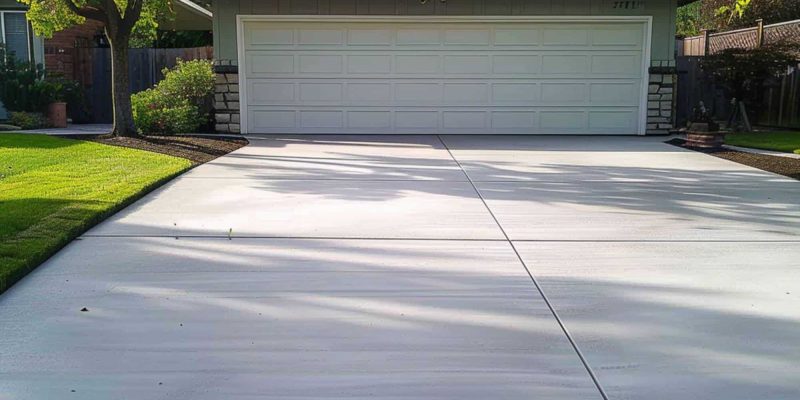Welcome, Waco homeowners! Are you considering upgrading your home’s curb appeal with a new driveway? Concrete driveways are not just about providing a path for your car; they’re an investment in your home’s value and beauty. Let’s dive into why a concrete driveway could be the perfect choice for your home, exploring everything from what goes into concrete to how you can keep it looking great for years to come.
Understanding Concrete: Composition and Uses in a House
Concrete is a strong material that’s been used for years in homes. It’s made from cement, water, and aggregates like sand or gravel. When mixed together, these ingredients harden into the durable surface we all know.
In homes, concrete is everywhere! It’s the solid foundation your house sits on, the patio where you enjoy BBQs, and, of course, the driveway where you park your car. Its strength and versatility make it a top choice for many parts of your home.
Different Finishes
When it comes to concrete driveways, there’s no need to stick to the plain, gray look. There are several finishing options to make your driveway stand out:
- Stamped Concrete: This finish presses patterns into the concrete before it fully dries, mimicking the look of brick, stone, or even wood, adding a touch of elegance to your driveway.
- Colored Concrete: By adding pigments to the concrete mix, your driveway can complement your home’s color scheme or stand out with a bold hue.
- Exposed Aggregate: This finish reveals the stones (aggregates) in the concrete for a textured look and extra slip resistance.
- Polished Concrete: For a modern, sleek look, polished concrete is ground down to a smooth finish, shining up your driveway.
Each of type of finishes adds character to your home, making your driveway a focal point…
Each of these finishes adds character to your home, making your driveway a focal point rather than just a functional space.
Weighing the Pros and Cons
Opting for a concrete driveway in Waco brings a mix of benefits and considerations you should be aware of:
Benefits
- Durability: Concrete stands up to hot Texas summers and occasional cold snaps, lasting for many years with proper care.
- Low Maintenance: Unlike asphalt, concrete doesn’t need frequent resealing. A good clean and occasional sealing every few years are usually enough.
- Customization: With various finishes available, your driveway can be as unique as your home.
Issues to Consider
- Cost: The initial outlay for a concrete driveway is higher than some materials, but its longevity can make it more cost-effective in the long run.
- Cracking: Over time, any concrete surface can develop cracks due to ground movement or heavy loads. Regular maintenance can manage this issue.
- Stain Potential: Oil and other spills can stain concrete, though sealing helps protect against this.
Tips for Keeping Your Driveway Pristine
Keeping your concrete driveway in top shape is straightforward with these tips:
- Regular Cleaning: Sweep off leaves and debris, and wash the surface with a hose. For tough stains, a mild detergent and a stiff brush can do wonders.
- Sealing: Apply a concrete sealer every few years to prevent water absorption, stains, and cracks. This is especially important in areas that see a lot of rain or have freezing temperatures in winter.
- Crack Management: Small cracks can grow if left unattended. Fill them with a concrete crack filler or hire a professional to keep your driveway smooth and safe.
NOTE
Following these simple maintenance steps will keep your driveway a durable and attractive entrance to your home for many years.
Common Queries About Concrete Driveways
Expanding on the common questions homeowners might have about concrete driveways provides a deeper understanding of what to expect when considering this durable and versatile option for your home.
Best Time of Year to Install a Concrete Driveway
Why Timing Matters: Concrete needs the right temperature and weather conditions to cure properly. Extreme temperatures, either too hot or too cold, can adversely affect the curing process, leading to potential issues with the driveway’s durability and finish.
Ideal Conditions: In Waco, the spring and fall seasons offer the most favorable weather conditions for concrete installation. The mild temperatures during these months ensure that the concrete can set and cure at an optimal rate, reducing the risk of cracking and other complications that can arise from rapid drying or freezing.
Planning Your Project: It’s important to consult with a professional concrete contractor who understands the local climate and can advise on the best timing for your driveway installation. This planning ensures that your project is completed under the best conditions possible, leading to a stronger and longer-lasting driveway.
Lifespan of a Concrete Driveway
Durability and Longevity: One of the most appealing aspects of a concrete driveway is its ability to withstand the test of time. Properly installed and maintained concrete driveways can last for 30 years or more, significantly longer than alternative materials like asphalt.
Factors Affecting Lifespan: Several factors can influence how long your concrete driveway will last, including the quality of materials used, the expertise of the installation team, and the level of ongoing maintenance. Regular cleaning, sealing, and timely repair of any cracks or damage are crucial for maximizing the lifespan of your driveway.
Comparing to Other Materials: When considering the cost and longevity of different driveway materials, concrete often emerges as the most cost-effective choice over the long term. While the initial investment may be higher, the extended lifespan and lower maintenance requirements of concrete driveways provide significant value.
Cost Estimates for a Concrete Driveway
Understanding the Costs: The cost of installing a concrete driveway can vary widely based on several factors, including the driveway’s size, the concrete’s thickness, and any decorative finishes or colors you choose to add.
Average Price Range: Generally, homeowners can expect to pay between $4 and $18 per square foot for a basic concrete driveway. However, prices can increase for custom designs, such as stamped or colored concrete, which require additional labor and materials.
Budgeting for Quality: Investing in a high-quality concrete mix and professional installation can save money in the long run by reducing the need for repairs and extending the life of your driveway. It’s also wise to get multiple quotes from reputable contractors to ensure you’re getting a fair and competitive price for your project.
DIY vs. Professional Installation
The DIY Approach: While some homeowners may consider pouring a concrete driveway themselves to save on labor costs, it’s important to understand the challenges and risks involved. Concrete work requires precise timing, specialized tools, and a thorough understanding of the material’s behavior.
Benefits of Professional Installation: Hiring experienced professionals ensures that your driveway is installed correctly, with the right mix and finishing techniques for a durable and attractive result. Professionals can also navigate any potential issues, such as uneven ground or drainage concerns, that could affect the quality of the finished driveway.
Making the Decision: If you have experience with concrete work and the necessary equipment, a DIY project could be feasible for smaller driveways. However, for most homeowners, the complexity and scale of pouring a driveway suggest that hiring professionals is the best choice to ensure a high-quality, long-lasting result.
Enhancing Your Driveway and Property Value
A well-thought-out concrete driveway does more than just serve as a place to park your car; it enhances the overall appearance and value of your property. Here are a few additional topics to consider:
- Landscaping Integration: A driveway should complement your home’s landscaping. Consider the surrounding greenery and how the driveway’s color and texture can harmonize with your yard.
- Lighting and Safety: Proper lighting can not only highlight your beautiful driveway at night but also provide safety for vehicles and pedestrians. Consider solar or LED lights along the driveway’s edges.
- Sustainability Considerations: Concrete is a durable and long-lasting material, but it’s also important to consider its environmental impact. Choosing a local supplier can reduce transportation emissions, and some concrete mixes include recycled materials, making your driveway more eco-friendly.
Conclusion
Choosing a concrete driveway for your home is a decision that offers many benefits, from durability and low maintenance to aesthetic flexibility and increased property value. By understanding the composition of concrete, the various finishes available, and how to properly maintain your driveway, you can ensure that your investment remains strong and beautiful for decades. Remember, while the initial cost may be higher than other materials, the longevity and added curb appeal of a concrete driveway can make it a worthwhile investment for your home.

